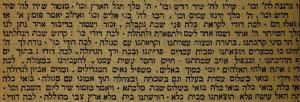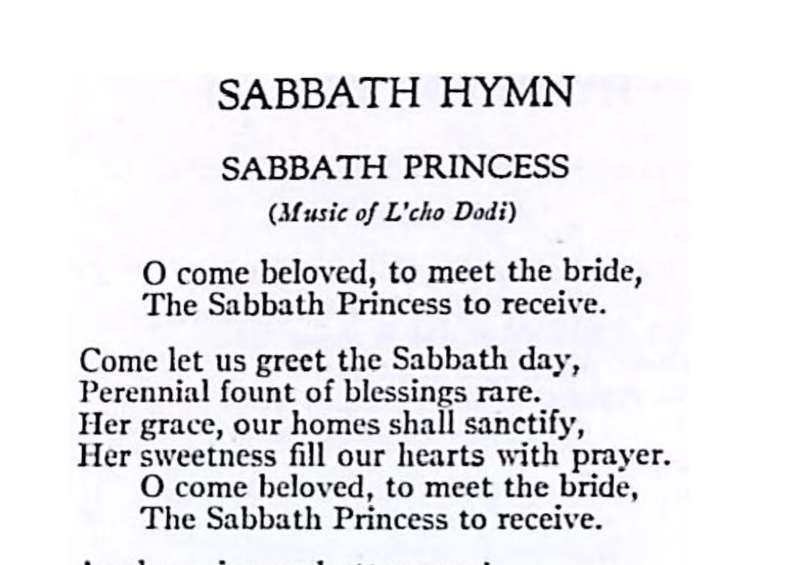One of the most fascinating parts of the Seder haYom is ibn Makhir’s description of Kabbalat Shabbat, where he suggests that members of the community physically go out into the fields, the garden, and the courtyards and welcome the Shabbat bride. In this description (which is also the earliest known source for the custom of reading Psalms 95 through 99 on Kabbalat Shabbat), ibn Makhir codifies a variant version of Lekhah Dodi.
This version shares the same refrain and similar (albeit altered) versions of the first and last verses, but its placement in the service is very distinct from standard modern practice. After six verses (concluding with the parallel to the standard text’s last verse), we recite the entirety of Psalm 92, the official opening of Shabbat. This is then followed by a seventh verse and a repetition of the refrain – thus not just leading into Psalm 92 but totally enveloping it! Also fascinating is this version’s emphasis on the exodus and liberation from Egypt, something not found in the standard version whose themes are more messianic.
This version of Lekhah Dodi is already a neat bit of liturgical history, but it would also be a wonderful custom to resurrect for those who seek to combine the wonder of Shabbat and the wonder of the natural world, or those who wish to avoid the emphasis on apocalyptic change in the more common text.
The original text from which this is derived comes from the open-source worker’s best friend, the Internet Archive.
In the translation below, “the Cause” is used in place of the Divine Name YHVH, based on the philosophical idea of God as the Prime Mover and on the interpretation of the Name as a causative form of the copula – “causes to be.”
| Source (Hebrew) | Translation (English) |
|---|---|
לְכָה דוֹדִי לִקְרַאת כַּלָּה פְּנֵי שַׁבָּת נְקַבְּלָה׃ |
Come, beloved, to greet the Bride, the face of Shabbat we will receive. |
זָכוֹר וְשָׁמוֹר בְּדִבּוּר אֶחָד נָתַן לָנוּ הַמֶּלֶךְ הַמְּיֻחָד ה׳ אֶחָד וּשְׁמוֹ אֶחָד לְשֵׁם וּלְתִפְאֶרֶת וְלִתְהִלָּה׃ לְכָה דוֹדִי לִקְרַאת כַּלָּה פְּנֵי שַׁבָּת נְקַבְּלָה׃ |
Remember and keep in a single word, The Only Sovereign gave to us. The Cause is one, the Name is One, To the Name, and to glory, and to praise! Come, beloved, to greet the Bride, the face of Shabbat we will receive. |
קְדוֹשׁ שַׁבָּת הִנְחַלְתָּנוּ אֶל הַר סִינַי קֵרַבְתָּנוּ בְּתוֹרָה וּמִצְוָה עִטַּרְתָּנוּ וּקְרָאתָנוּ עַם סְגוּלָה׃ לְכָה דוֹדִי לִקְרַאת כַּלָּה פְּנֵי שַׁבָּת נְקַבְּלָה׃ |
The holiness of Shabbat You endowed us, Towards Mt. Sinai You brought us, In law and commandments You crowned us And You called us a treasured people! Come, beloved, to greet the Bride, the face of Shabbat we will receive. |
נוֹדֶה לְךָ ה׳ אֱלֹהֵינוּ כִּי מִמִּצְרַיִם הוֹצֵאתָנוּ וּמִבֵּית עֲבָדִים פְּדִיתָנוּ וּבְכֹחַ יָדְךָ הַגְּדוֹלָה׃ לְכָה דוֹדִי לִקְרַאת כַּלָּה פְּנֵי שַׁבָּת נְקַבְּלָה׃ |
We thank You, O Cause our God, For from Egypt You took us out, And from the house of slaves You redeemed us And with the strength of Your Great Hand, Come, beloved, to greet the Bride, the face of Shabbat we will receive. |
בְּתוֹךְ יַם סוּף הִדְרַכְתָּנוּ וּבִנְפוֹל אוֹיֵב שִׂמַּחְתָּנוּ חַיִּים וָחֶסֶד עָשִׂיתָ עִמָּנוּ לְהַעֲבִירֵנוּ בִּמְצוּלָה׃ לְכָה דוֹדִי לִקְרַאת כַּלָּה פְּנֵי שַׁבָּת נְקַבְּלָה׃ |
In the midst of the Reed Sea You guided us And at the downfall of our enemies You gladdened us Life and mercy You made with us To pass us through in the depths. Come, beloved, to greet the Bride, the face of Shabbat we will receive. |
אַתָּה אֱלֹהֵי הָאֱלֹהִים וּמִי כָּמוֹךָ בָּאֵלִים מַשְׁפִּיל גֵּאִים הַמַּגְדִּילִים וּמֵרִים אֶבְיוֹן לִגְדוּלָּה׃ לְכָה דוֹדִי לִקְרַאת כַּלָּה פְּנֵי שַׁבָּת נְקַבְּלָה׃ |
You are the God of Gods, And who is like You among the gods? Who humiliates the haughty grandiose And raises the lowly to grandness Come, beloved, to greet the Bride, the face of Shabbat we will receive. |
בּוֹאִי בְּשָׁלוֹם עֲטֶרֶת בַּעֲלָהּ וְגַם בְּשִׁמְחָה וּבְצָהֳלָה תּוֹךְ אֱמוּנֵי עַם סְגוּלָה בּוֹאִי כַּלָּה בּוֹאִי כַּלָּה בּוֹאִי כַּלָּה בּוֹאִי כַּלָּה בּוֹאִי בְּשִׁלּוּם שַׁבָּת מַלְכְּתָא׃ |
Come in peace, crown of Her husband! As well in joy and in merriment! In the midst of the believers, the Treasured People, Come, o Bride, come, o Bride! Come, o Bride, come, o Bride! Come in peace, Shabbat, Queen! |
וְיֵאָמֵר מִזְמ֥וֹר שִׁ֗יר לְי֣וֹם הַשַּׁבָּֽת׃ |
And it is said: A psalm, a song for the Day of Shabbat. |
ט֗וֹב לְהֹד֥וֹת לַיהֹוָ֑ה וּלְזַמֵּ֖ר לְשִׁמְךָ֣ עֶלְיֽוֹן׃ לְהַגִּ֣יד בַּבֹּ֣קֶר חַסְדֶּ֑ךָ וֶ֝אֱמ֥וּנָתְךָ֗ בַּלֵּילֽוֹת׃ |
It is good to thank the Cause, and to hymn to Your Name, Highest! To tell of Your mercy in the morning, and Your trust in the nights! |
עֲֽלֵי־עָ֭שׂוֹר וַעֲלֵי־נָ֑בֶל עֲלֵ֖י הִגָּי֣וֹן בְּכִנּֽוֹר׃ |
Upon the ten-string and upon the jar-lute and upon the pipe and the lyre! |
כִּ֤י שִׂמַּחְתַּ֣נִי יְהֹוָ֣ה בְּפׇעֳלֶ֑ך בְּֽמַעֲשֵׂ֖י יָדֶ֣יךָ אֲרַנֵּֽן׃ מַה־גָּדְל֣וּ מַעֲשֶׂ֣יךָ יְהֹוָ֑ה מְ֝אֹ֗ד עָמְק֥וּ מַחְשְׁבֹתֶֽיךָ׃ |
For You gladden me, Cause, with Your deeds, and the work of Your hands I praise. How great are Your works, Cause, how greatly profound Your designs! |
אִֽישׁ־בַּ֭עַר לֹ֣א יֵדָ֑ע וּ֝כְסִ֗יל לֹא־יָבִ֥ין אֶת־זֹֽאת׃ בִּפְרֹ֤חַ רְשָׁעִ֨ים ׀ כְּמ֥וֹ עֵ֗שֶׂב וַ֭יָּצִיצוּ כׇּל־פֹּ֣עֲלֵי אָ֑וֶן לְהִשָּׁמְדָ֥ם עֲדֵי־עַֽד׃ |
A brute of a man does not know, a fool does not understand this: The wicked flourish like grass and all doers of evil blossom to be destroyed forevermore. |
וְאַתָּ֥ה מָר֗וֹם לְעֹלָ֥ם יְהֹוָֽה׃ כִּ֤י הִנֵּ֪ה אֹיְבֶ֡יךָ ׀ יְֽהֹוָ֗ה כִּֽי־הִנֵּ֣ה אֹיְבֶ֣יךָ יֹאבֵ֑דוּ יִ֝תְפָּרְד֗וּ כׇּל־פֹּ֥עֲלֵי אָֽוֶן׃ |
But You are on High forever, Cause! For behold Your enemies, Cause; behold Your enemies, lost; scattered about all doers of evil. |
וַתָּ֣רֶם כִּרְאֵ֣ים קַרְנִ֑י בַּ֝לֹּתִ֗י בְּשֶׁ֣מֶן רַעֲנָֽן׃ וַתַּבֵּ֥ט עֵינִ֗י בְּשׁ֫וּרָ֥י בַּקָּמִ֖ים עָלַ֥י מְרֵעִ֗ים תִּשְׁמַ֥עְנָה אׇזְנָֽי׃ |
But You raise my horn like the aurochs, You douse me in healthy oil. My eyes behold those watching me, as the evil ones rise against me, my ears hear! |
צַ֭דִּיק כַּתָּמָ֣ר יִפְרָ֑ח כְּאֶ֖רֶז בַּלְּבָנ֣וֹן יִשְׂגֶּֽה׃ שְׁ֭תוּלִים בְּבֵ֣ית יְהֹוָ֑ה בְּחַצְר֖וֹת אֱלֹהֵ֣ינוּ יַפְרִֽיחוּ׃ ע֭וֹד יְנוּב֣וּן בְּשֵׂיבָ֑ה דְּשֵׁנִ֖ים וְֽרַעֲנַנִּ֣ים יִהְיֽוּ׃ לְ֭הַגִּיד כִּֽי־יָשָׁ֣ר יְהֹוָ֑ה צ֝וּרִ֗י וְֽלֹא־עַוְלָ֥תָה [עלתה] בּֽוֹ׃ |
The righteous flourish like a palm, thrive like a Lebanon cedar. Planted in the house of the Cause, in the courts of our God they flourish. They will yet bear fruit in old age, vigorous and healthy are they! To tell that the Cause is upright, my Rock, in Whom there is no flaw! |
אַתָּה הָאֵל עֹשֵׂה פֶלֶא הוֹצֵאתָנוּ מִבֵּית כֶּלֶא הוֹרַשְׁתָּנוּ בַּיִת מָלֵא אֶרֶץ צְבִי מְהֻלָּלָה׃ לְכָה דוֹדִי לִקְרַאת כַּלָּה פְּנֵי שַׁבָּת נְקַבְּלָה׃ |
You are the God, maker of wonders, You brought us out from the prison-house, You bequeathed us a full house The praised Splendid Land. Come, beloved, to greet the Bride, the face of Shabbat we will receive. |
נוסח אחר של הפיוט לכה דודי לפי ספר ׳סדר היום׳ על ידי ר׳ משה אבן מכיר זצ״ל, מנוקדת ומתורגמת לאנגלית על ידי יצחק הראל בן אברהם מאיר הכהן. (A different version of the poem Lekhah Dodi according to the book Seder haYom by R. Moshe ibn Makhir of righteous blessed memory, vocalized and translated into English by Isaac Mayer.)
Source


“לכה דודי (נוסח אחר) | A different version of Lekhah Dodi found in R’ Moshe ibn Makhir’s Seder haYom (1599)” is shared through the Open Siddur Project with a Creative Commons Attribution-ShareAlike 4.0 International copyleft license.










Leave a Reply